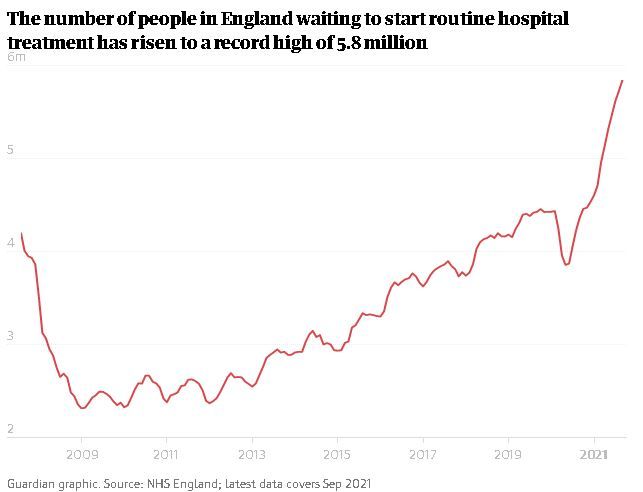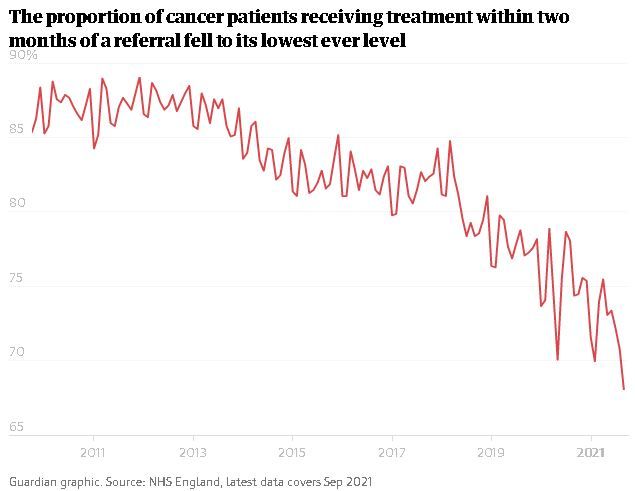NHS Confederation chief says many hospitals only able to cope with emergency patients
Many hospitals are now only able to cope with people coming through emergency departments, the NHS Confederation chief has said as figures showed numbers waiting to start routine hospital treatment in England are at a new record high.
A total of 5.8 million people were waiting to start treatment at the end of September, according to figures from NHS England. This is the highest number since records began in August 2007.
Pressure had built up primarily because people who had chosen not to come forward for treatment were doing so now, said Matthew Taylor, the chief executive of the confederation, which represents many organisations that commission and provide NHS services in England, Wales and Northern Ireland.

Nine in 10 NHS chief executives, chairs and directors reported in a survey to the confederation this week that the pressures on their organisation have become unsustainable. The same proportion is sounding alarm bells over staffing, with the lack of doctors, nurses and other health workers putting lives of patients at risk.
Many of its members were still confident that progress could be made on treatment lists if the health service got through a difficult winter, Taylor said on the BBC’s Today programme.
However, he also warned: “The government has rightly said that we need to make inroads into that backlog but many hospitals are only able to cope now with people coming through emergency departments. They are not able to make any real inroads into the elective care backlog.”
The number of people having to wait more than 52 weeks to start treatment stood at 300,566 in September 2021, up from 292,138 in the previous month and more than double the number waiting a year earlier, in September 2020, which was 139,545.
There was also a deterioration in the response times for ambulances in England, which took an average of 53 minutes and 54 seconds last month to respond to emergency calls, such as burns, epilepsy and strokes.
This was up from 45 minutes and 30 seconds in September and the longest average response time since current records began in August 2017. Response times for urgent calls, such as late stages of labour and non-severe burns, averaged three hours, nine minutes and 58 seconds. This is up from two hours, 35 minutes and 45 seconds in September, and was the longest average since current records were kept.

In terms of surgery waiting times, Fiona Myint, the vice-president of the Royal College of Surgeons of England, said that lengthening delays and cancellations were becoming a source of frustration for patients in constituencies across the country. “Their lives are effectively on hold, waiting for planned surgery on hips and knees. Surgical procedures to treat aneurysms and prevent heart attacks are also affected.”
Nearly 370,000 patients in England had meanwhile been waiting more than six weeks for a key diagnostic test in September. A total of 369,207 patients were waiting for one of 15 standard tests, including an MRI scan, non-obstetric ultrasound or gastroscopy, NHS England said.
The equivalent number waiting for more than six weeks in September 2020 was 419,841, while pre-pandemic in September 2019 there were 38,802 people waiting.
The proportion of cancer patients receiving their first specialist treatment within two months of a GP referral also fell to a new low, according to Guardian analysis, with just 68% of the 14,866 patients in England starting treatment within two months.
In September, the proportion of cancer patients who had their first consultant appointment within two weeks also fell to the second-lowest level since 2009. However, another key cancer metric was much closer to NHS targets: about 93% of patients started treatment within a month after a “decision to treat”, compared with a target of 96%.
Minesh Patel, the head of policy at Macmillan Cancer Support, said: “It’s deeply concerning to see that record numbers of people waited too long to see a specialist and start cancer treatment in September. On top of this, progress to clear the backlog stalled.
“As we approach yet another difficult winter, it’s vital the government urgently provides the NHS with the support and investment required to ensure everyone with cancer receives the care and support they need and deserve.”
For the fourth consecutive month the proportion of A&E patients seen within the NHS’s target of four hours was the lowest since the time series began in January 2010. In October, just 61.9% of patients were seen within four hours at major A&Es, down from 64% in the previous month.
Jonathan Ashworth MP, the shadow health and social care secretary, said the new figures were confirmation of “dangerously lengthy” waiting times patients are forced to endure and the scale of pressure on overwhelmed A&Es.
“The coming winter weeks are set to be the most challenging in history for the NHS. It’s now urgent ministers fix the stalling vaccination programme, resolve the immediate crisis in social care and bring forward a long-term plan to recruit the healthcare staff our NHS now desperately needs, which Rishi Sunak has failed to provide despite imposing a punishing tax rise on working people.”
Prof Stephen Powis, NHS national medical director, said there was no doubt that pressure on the health service remained “incredibly high”.
“Increasing numbers are coming forward for treatment and this is expected to go up, but it remains really important people do not delay seeking help from the NHS if they feel unwell,” he said, referring those in need of help to NHS 111 online as a first port of call.















